Corporate Accounting Report: Fair Value Disclosures and Analysis
VerifiedAdded on 2023/06/05
|8
|1972
|135
Report
AI Summary
This report delves into the concept of corporate accounting, specifically focusing on fair value accounting (FVA). It begins by tracing the evolution of accounting and the introduction of FVA, which aims to disclose the value of assets and liabilities at potential market prices. The report acknowledges the debates surrounding FVA, especially in light of accounting scandals, while highlighting its relevance in corporate reporting. It contrasts FVA with historical costing, discussing the advantages and disadvantages of each method. The report then examines the use of FVA in two Australian companies, Queste Communications Limited and TPG Telecom Limited, analyzing their financial disclosures and valuation methods for various assets and liabilities, including property, plant, and equipment, intangible assets, inventories, and trade receivables. The report uses the annual reports to demonstrate the practical application of FVA. The report concludes by emphasizing the importance of the integrity of management in financial reporting and the need for ongoing development and improvement in accounting practices.
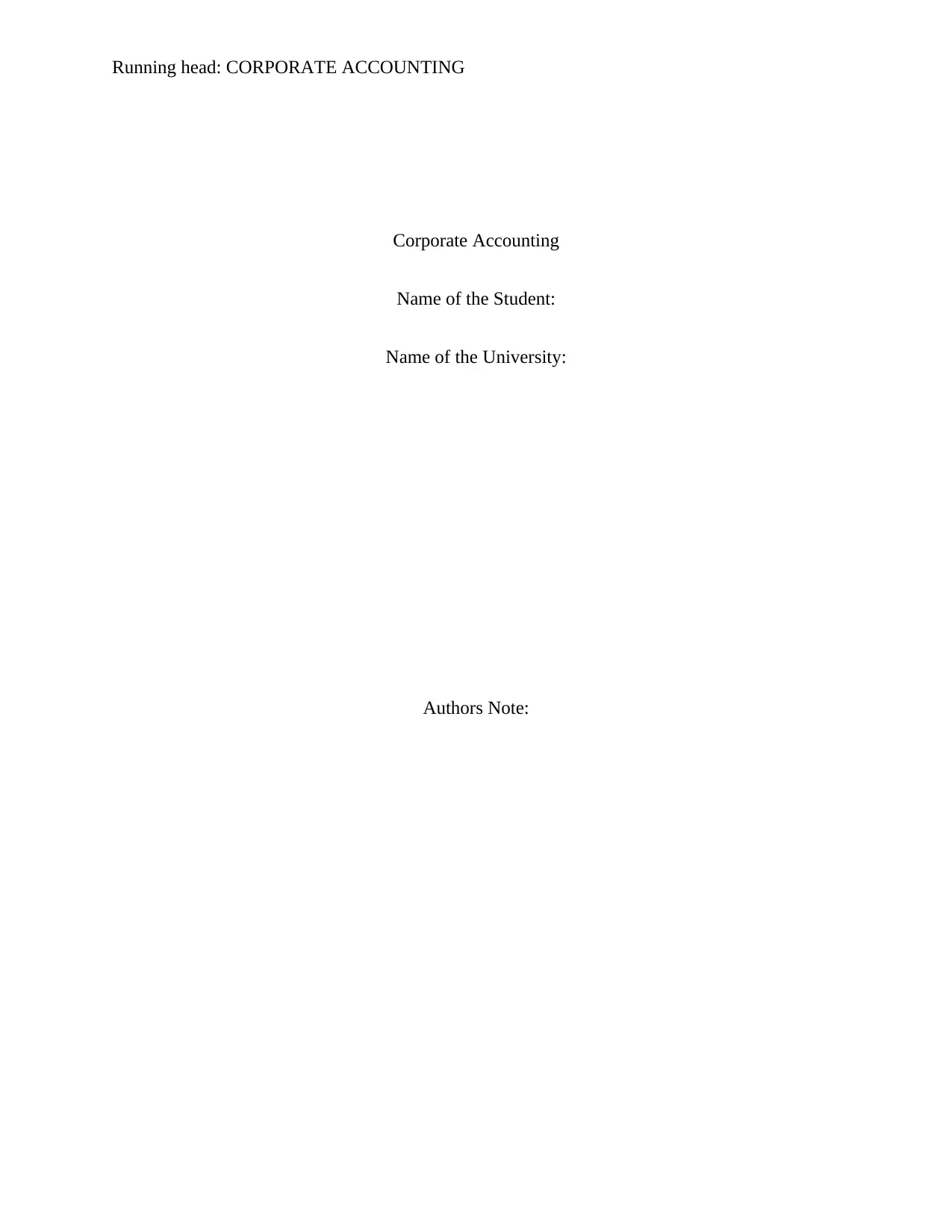
Running head: CORPORATE ACCOUNTING
Corporate Accounting
Name of the Student:
Name of the University:
Authors Note:
Corporate Accounting
Name of the Student:
Name of the University:
Authors Note:
Paraphrase This Document
Need a fresh take? Get an instant paraphrase of this document with our AI Paraphraser
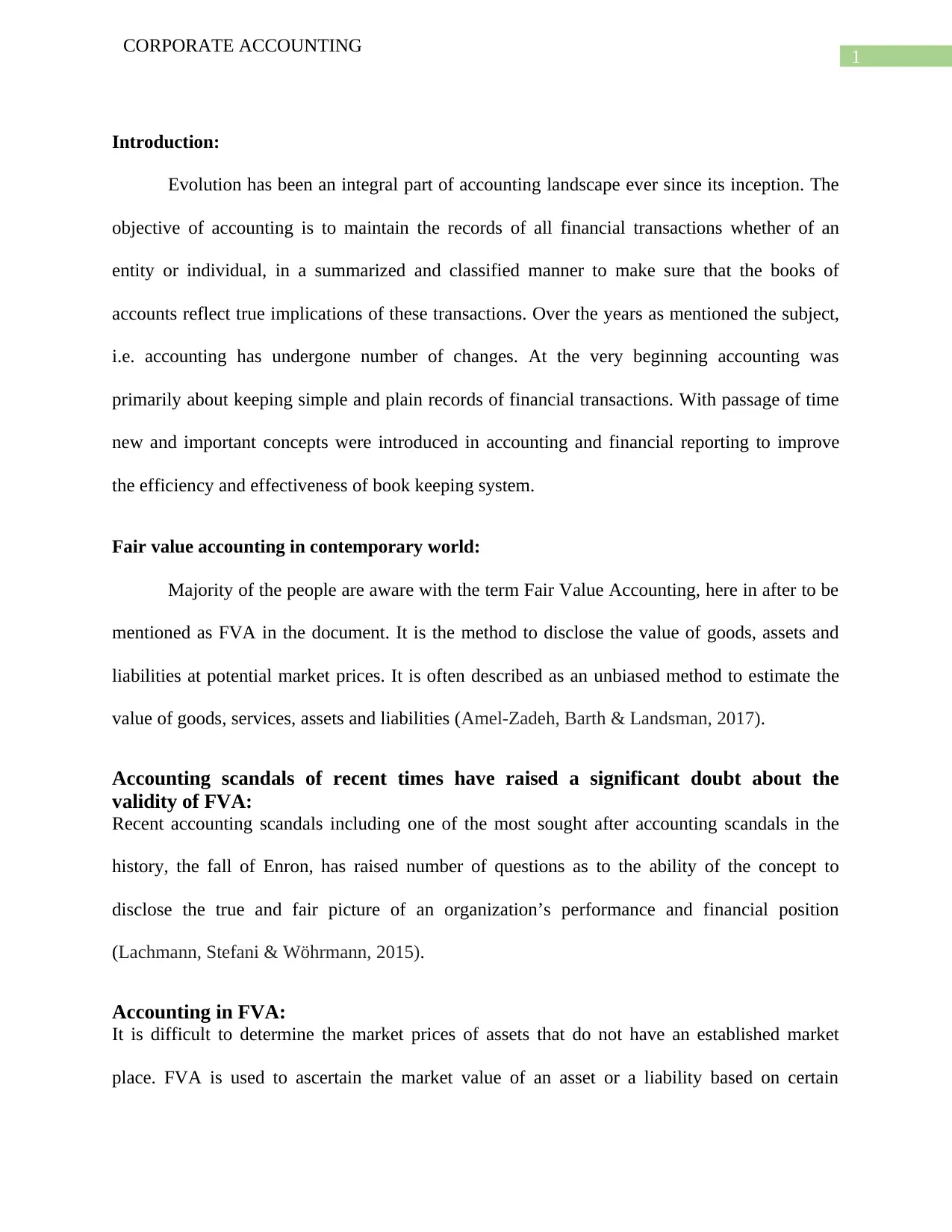
1
CORPORATE ACCOUNTING
Introduction:
Evolution has been an integral part of accounting landscape ever since its inception. The
objective of accounting is to maintain the records of all financial transactions whether of an
entity or individual, in a summarized and classified manner to make sure that the books of
accounts reflect true implications of these transactions. Over the years as mentioned the subject,
i.e. accounting has undergone number of changes. At the very beginning accounting was
primarily about keeping simple and plain records of financial transactions. With passage of time
new and important concepts were introduced in accounting and financial reporting to improve
the efficiency and effectiveness of book keeping system.
Fair value accounting in contemporary world:
Majority of the people are aware with the term Fair Value Accounting, here in after to be
mentioned as FVA in the document. It is the method to disclose the value of goods, assets and
liabilities at potential market prices. It is often described as an unbiased method to estimate the
value of goods, services, assets and liabilities (Amel-Zadeh, Barth & Landsman, 2017).
Accounting scandals of recent times have raised a significant doubt about the
validity of FVA:
Recent accounting scandals including one of the most sought after accounting scandals in the
history, the fall of Enron, has raised number of questions as to the ability of the concept to
disclose the true and fair picture of an organization’s performance and financial position
(Lachmann, Stefani & Wöhrmann, 2015).
Accounting in FVA:
It is difficult to determine the market prices of assets that do not have an established market
place. FVA is used to ascertain the market value of an asset or a liability based on certain
CORPORATE ACCOUNTING
Introduction:
Evolution has been an integral part of accounting landscape ever since its inception. The
objective of accounting is to maintain the records of all financial transactions whether of an
entity or individual, in a summarized and classified manner to make sure that the books of
accounts reflect true implications of these transactions. Over the years as mentioned the subject,
i.e. accounting has undergone number of changes. At the very beginning accounting was
primarily about keeping simple and plain records of financial transactions. With passage of time
new and important concepts were introduced in accounting and financial reporting to improve
the efficiency and effectiveness of book keeping system.
Fair value accounting in contemporary world:
Majority of the people are aware with the term Fair Value Accounting, here in after to be
mentioned as FVA in the document. It is the method to disclose the value of goods, assets and
liabilities at potential market prices. It is often described as an unbiased method to estimate the
value of goods, services, assets and liabilities (Amel-Zadeh, Barth & Landsman, 2017).
Accounting scandals of recent times have raised a significant doubt about the
validity of FVA:
Recent accounting scandals including one of the most sought after accounting scandals in the
history, the fall of Enron, has raised number of questions as to the ability of the concept to
disclose the true and fair picture of an organization’s performance and financial position
(Lachmann, Stefani & Wöhrmann, 2015).
Accounting in FVA:
It is difficult to determine the market prices of assets that do not have an established market
place. FVA is used to ascertain the market value of an asset or a liability based on certain
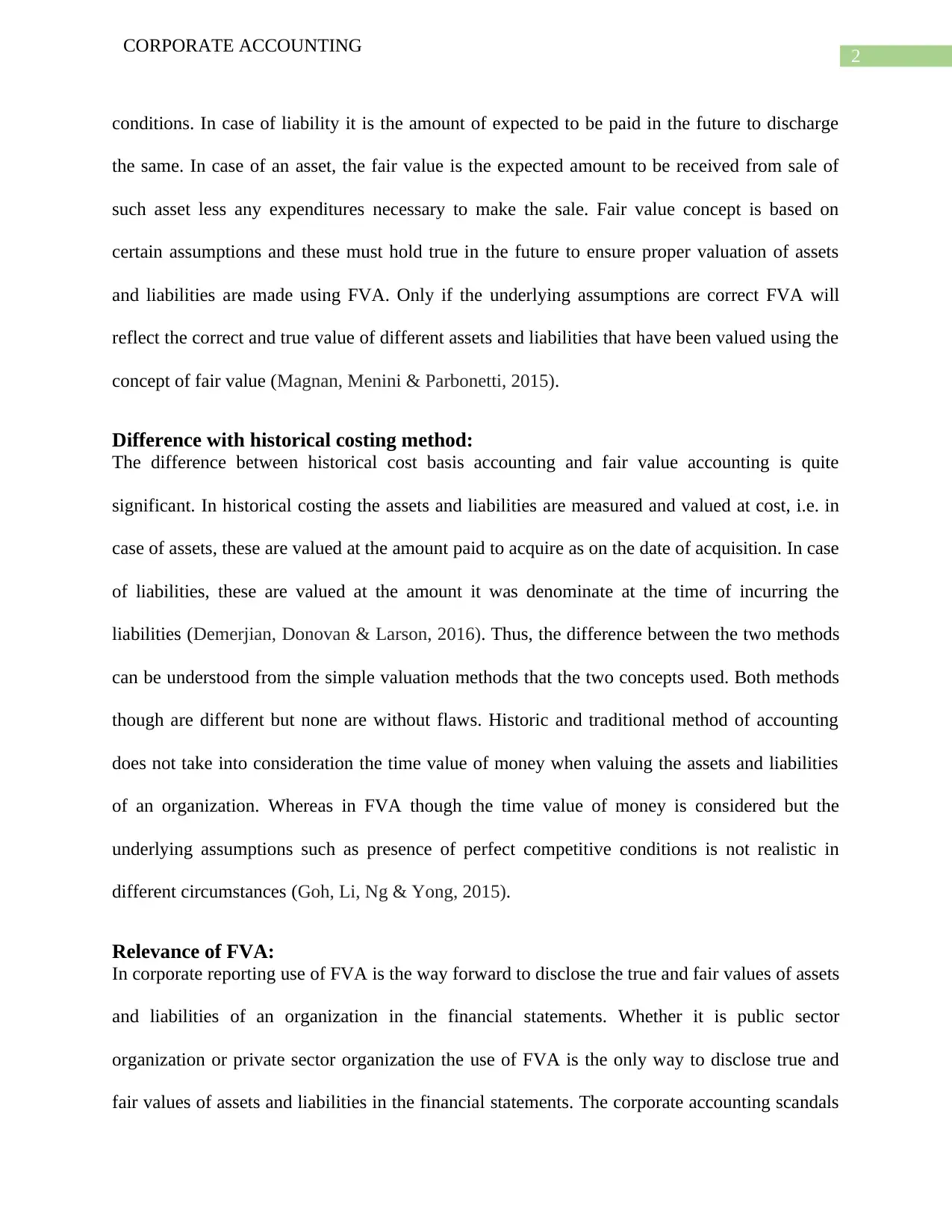
2
CORPORATE ACCOUNTING
conditions. In case of liability it is the amount of expected to be paid in the future to discharge
the same. In case of an asset, the fair value is the expected amount to be received from sale of
such asset less any expenditures necessary to make the sale. Fair value concept is based on
certain assumptions and these must hold true in the future to ensure proper valuation of assets
and liabilities are made using FVA. Only if the underlying assumptions are correct FVA will
reflect the correct and true value of different assets and liabilities that have been valued using the
concept of fair value (Magnan, Menini & Parbonetti, 2015).
Difference with historical costing method:
The difference between historical cost basis accounting and fair value accounting is quite
significant. In historical costing the assets and liabilities are measured and valued at cost, i.e. in
case of assets, these are valued at the amount paid to acquire as on the date of acquisition. In case
of liabilities, these are valued at the amount it was denominate at the time of incurring the
liabilities (Demerjian, Donovan & Larson, 2016). Thus, the difference between the two methods
can be understood from the simple valuation methods that the two concepts used. Both methods
though are different but none are without flaws. Historic and traditional method of accounting
does not take into consideration the time value of money when valuing the assets and liabilities
of an organization. Whereas in FVA though the time value of money is considered but the
underlying assumptions such as presence of perfect competitive conditions is not realistic in
different circumstances (Goh, Li, Ng & Yong, 2015).
Relevance of FVA:
In corporate reporting use of FVA is the way forward to disclose the true and fair values of assets
and liabilities of an organization in the financial statements. Whether it is public sector
organization or private sector organization the use of FVA is the only way to disclose true and
fair values of assets and liabilities in the financial statements. The corporate accounting scandals
CORPORATE ACCOUNTING
conditions. In case of liability it is the amount of expected to be paid in the future to discharge
the same. In case of an asset, the fair value is the expected amount to be received from sale of
such asset less any expenditures necessary to make the sale. Fair value concept is based on
certain assumptions and these must hold true in the future to ensure proper valuation of assets
and liabilities are made using FVA. Only if the underlying assumptions are correct FVA will
reflect the correct and true value of different assets and liabilities that have been valued using the
concept of fair value (Magnan, Menini & Parbonetti, 2015).
Difference with historical costing method:
The difference between historical cost basis accounting and fair value accounting is quite
significant. In historical costing the assets and liabilities are measured and valued at cost, i.e. in
case of assets, these are valued at the amount paid to acquire as on the date of acquisition. In case
of liabilities, these are valued at the amount it was denominate at the time of incurring the
liabilities (Demerjian, Donovan & Larson, 2016). Thus, the difference between the two methods
can be understood from the simple valuation methods that the two concepts used. Both methods
though are different but none are without flaws. Historic and traditional method of accounting
does not take into consideration the time value of money when valuing the assets and liabilities
of an organization. Whereas in FVA though the time value of money is considered but the
underlying assumptions such as presence of perfect competitive conditions is not realistic in
different circumstances (Goh, Li, Ng & Yong, 2015).
Relevance of FVA:
In corporate reporting use of FVA is the way forward to disclose the true and fair values of assets
and liabilities of an organization in the financial statements. Whether it is public sector
organization or private sector organization the use of FVA is the only way to disclose true and
fair values of assets and liabilities in the financial statements. The corporate accounting scandals
⊘ This is a preview!⊘
Do you want full access?
Subscribe today to unlock all pages.

Trusted by 1+ million students worldwide
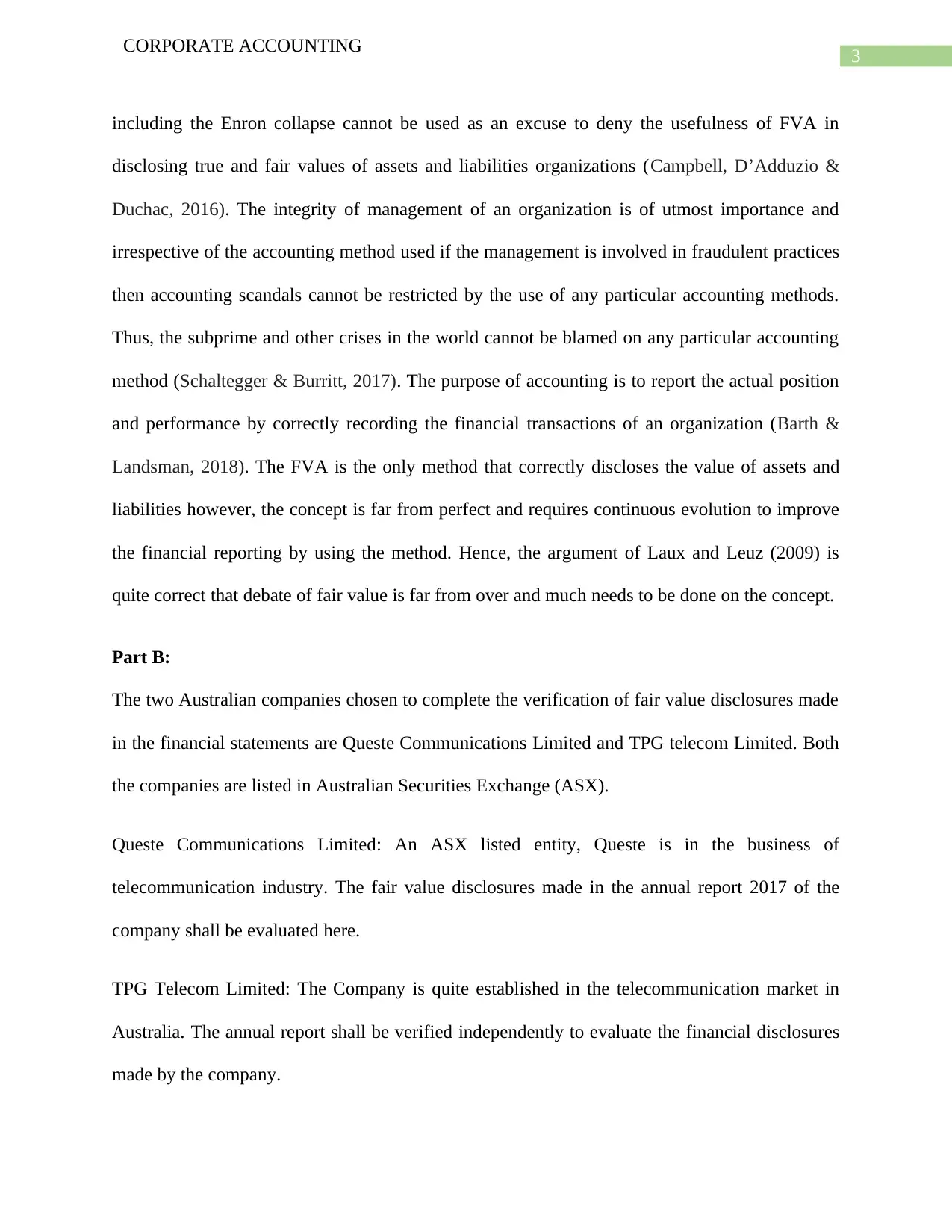
3
CORPORATE ACCOUNTING
including the Enron collapse cannot be used as an excuse to deny the usefulness of FVA in
disclosing true and fair values of assets and liabilities organizations (Campbell, D’Adduzio &
Duchac, 2016). The integrity of management of an organization is of utmost importance and
irrespective of the accounting method used if the management is involved in fraudulent practices
then accounting scandals cannot be restricted by the use of any particular accounting methods.
Thus, the subprime and other crises in the world cannot be blamed on any particular accounting
method (Schaltegger & Burritt, 2017). The purpose of accounting is to report the actual position
and performance by correctly recording the financial transactions of an organization (Barth &
Landsman, 2018). The FVA is the only method that correctly discloses the value of assets and
liabilities however, the concept is far from perfect and requires continuous evolution to improve
the financial reporting by using the method. Hence, the argument of Laux and Leuz (2009) is
quite correct that debate of fair value is far from over and much needs to be done on the concept.
Part B:
The two Australian companies chosen to complete the verification of fair value disclosures made
in the financial statements are Queste Communications Limited and TPG telecom Limited. Both
the companies are listed in Australian Securities Exchange (ASX).
Queste Communications Limited: An ASX listed entity, Queste is in the business of
telecommunication industry. The fair value disclosures made in the annual report 2017 of the
company shall be evaluated here.
TPG Telecom Limited: The Company is quite established in the telecommunication market in
Australia. The annual report shall be verified independently to evaluate the financial disclosures
made by the company.
CORPORATE ACCOUNTING
including the Enron collapse cannot be used as an excuse to deny the usefulness of FVA in
disclosing true and fair values of assets and liabilities organizations (Campbell, D’Adduzio &
Duchac, 2016). The integrity of management of an organization is of utmost importance and
irrespective of the accounting method used if the management is involved in fraudulent practices
then accounting scandals cannot be restricted by the use of any particular accounting methods.
Thus, the subprime and other crises in the world cannot be blamed on any particular accounting
method (Schaltegger & Burritt, 2017). The purpose of accounting is to report the actual position
and performance by correctly recording the financial transactions of an organization (Barth &
Landsman, 2018). The FVA is the only method that correctly discloses the value of assets and
liabilities however, the concept is far from perfect and requires continuous evolution to improve
the financial reporting by using the method. Hence, the argument of Laux and Leuz (2009) is
quite correct that debate of fair value is far from over and much needs to be done on the concept.
Part B:
The two Australian companies chosen to complete the verification of fair value disclosures made
in the financial statements are Queste Communications Limited and TPG telecom Limited. Both
the companies are listed in Australian Securities Exchange (ASX).
Queste Communications Limited: An ASX listed entity, Queste is in the business of
telecommunication industry. The fair value disclosures made in the annual report 2017 of the
company shall be evaluated here.
TPG Telecom Limited: The Company is quite established in the telecommunication market in
Australia. The annual report shall be verified independently to evaluate the financial disclosures
made by the company.
Paraphrase This Document
Need a fresh take? Get an instant paraphrase of this document with our AI Paraphraser
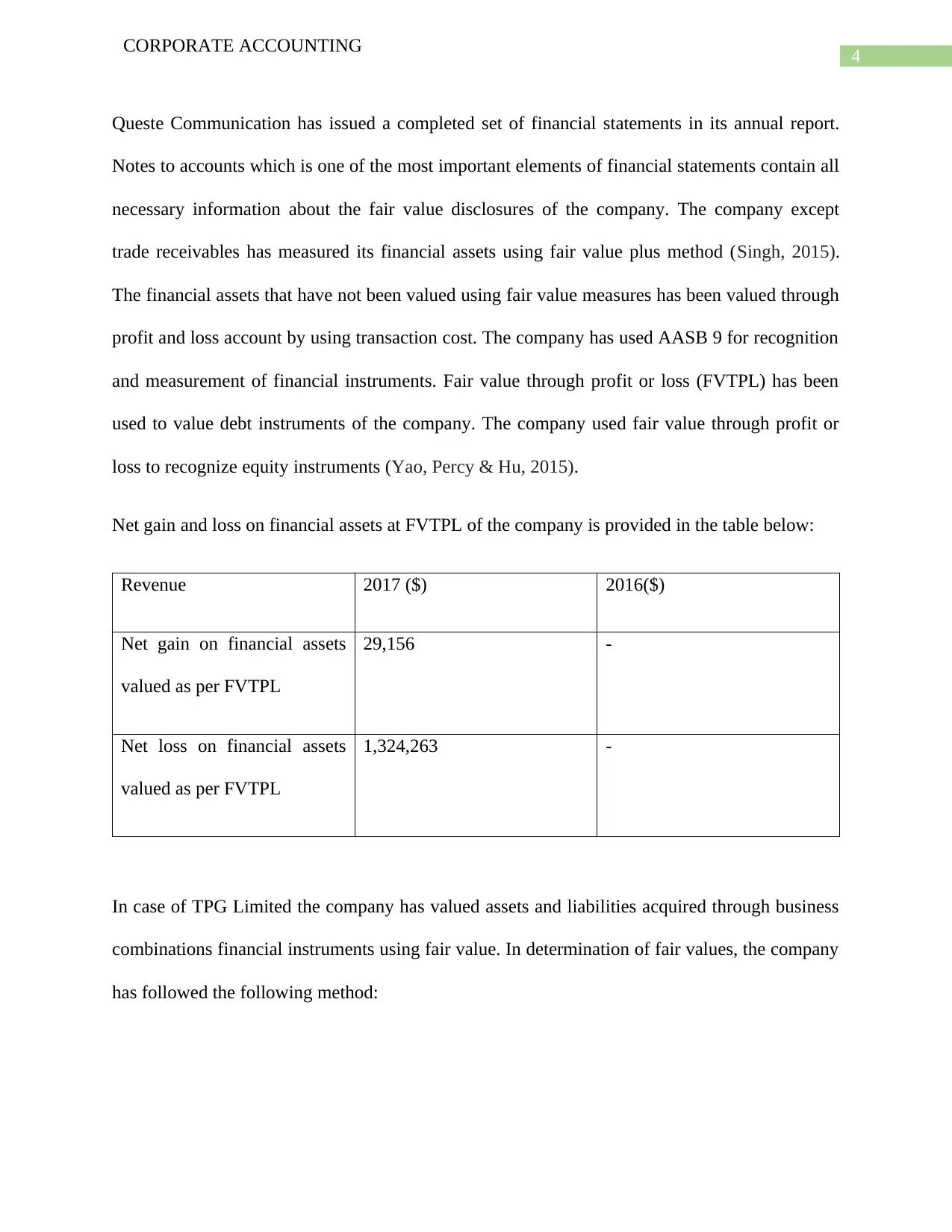
4
CORPORATE ACCOUNTING
Queste Communication has issued a completed set of financial statements in its annual report.
Notes to accounts which is one of the most important elements of financial statements contain all
necessary information about the fair value disclosures of the company. The company except
trade receivables has measured its financial assets using fair value plus method (Singh, 2015).
The financial assets that have not been valued using fair value measures has been valued through
profit and loss account by using transaction cost. The company has used AASB 9 for recognition
and measurement of financial instruments. Fair value through profit or loss (FVTPL) has been
used to value debt instruments of the company. The company used fair value through profit or
loss to recognize equity instruments (Yao, Percy & Hu, 2015).
Net gain and loss on financial assets at FVTPL of the company is provided in the table below:
Revenue 2017 ($) 2016($)
Net gain on financial assets
valued as per FVTPL
29,156 -
Net loss on financial assets
valued as per FVTPL
1,324,263 -
In case of TPG Limited the company has valued assets and liabilities acquired through business
combinations financial instruments using fair value. In determination of fair values, the company
has followed the following method:
CORPORATE ACCOUNTING
Queste Communication has issued a completed set of financial statements in its annual report.
Notes to accounts which is one of the most important elements of financial statements contain all
necessary information about the fair value disclosures of the company. The company except
trade receivables has measured its financial assets using fair value plus method (Singh, 2015).
The financial assets that have not been valued using fair value measures has been valued through
profit and loss account by using transaction cost. The company has used AASB 9 for recognition
and measurement of financial instruments. Fair value through profit or loss (FVTPL) has been
used to value debt instruments of the company. The company used fair value through profit or
loss to recognize equity instruments (Yao, Percy & Hu, 2015).
Net gain and loss on financial assets at FVTPL of the company is provided in the table below:
Revenue 2017 ($) 2016($)
Net gain on financial assets
valued as per FVTPL
29,156 -
Net loss on financial assets
valued as per FVTPL
1,324,263 -
In case of TPG Limited the company has valued assets and liabilities acquired through business
combinations financial instruments using fair value. In determination of fair values, the company
has followed the following method:
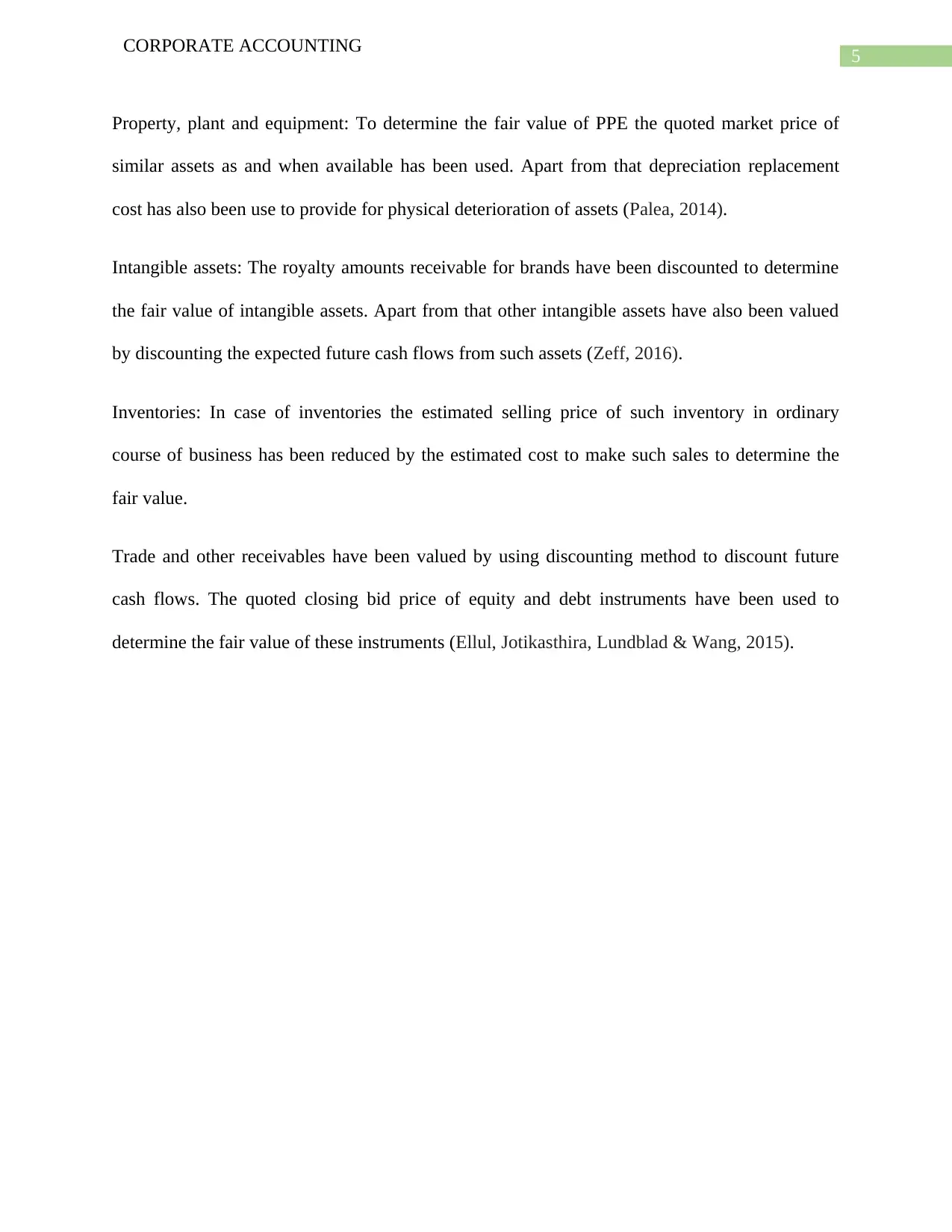
5
CORPORATE ACCOUNTING
Property, plant and equipment: To determine the fair value of PPE the quoted market price of
similar assets as and when available has been used. Apart from that depreciation replacement
cost has also been use to provide for physical deterioration of assets (Palea, 2014).
Intangible assets: The royalty amounts receivable for brands have been discounted to determine
the fair value of intangible assets. Apart from that other intangible assets have also been valued
by discounting the expected future cash flows from such assets (Zeff, 2016).
Inventories: In case of inventories the estimated selling price of such inventory in ordinary
course of business has been reduced by the estimated cost to make such sales to determine the
fair value.
Trade and other receivables have been valued by using discounting method to discount future
cash flows. The quoted closing bid price of equity and debt instruments have been used to
determine the fair value of these instruments (Ellul, Jotikasthira, Lundblad & Wang, 2015).
CORPORATE ACCOUNTING
Property, plant and equipment: To determine the fair value of PPE the quoted market price of
similar assets as and when available has been used. Apart from that depreciation replacement
cost has also been use to provide for physical deterioration of assets (Palea, 2014).
Intangible assets: The royalty amounts receivable for brands have been discounted to determine
the fair value of intangible assets. Apart from that other intangible assets have also been valued
by discounting the expected future cash flows from such assets (Zeff, 2016).
Inventories: In case of inventories the estimated selling price of such inventory in ordinary
course of business has been reduced by the estimated cost to make such sales to determine the
fair value.
Trade and other receivables have been valued by using discounting method to discount future
cash flows. The quoted closing bid price of equity and debt instruments have been used to
determine the fair value of these instruments (Ellul, Jotikasthira, Lundblad & Wang, 2015).
⊘ This is a preview!⊘
Do you want full access?
Subscribe today to unlock all pages.

Trusted by 1+ million students worldwide
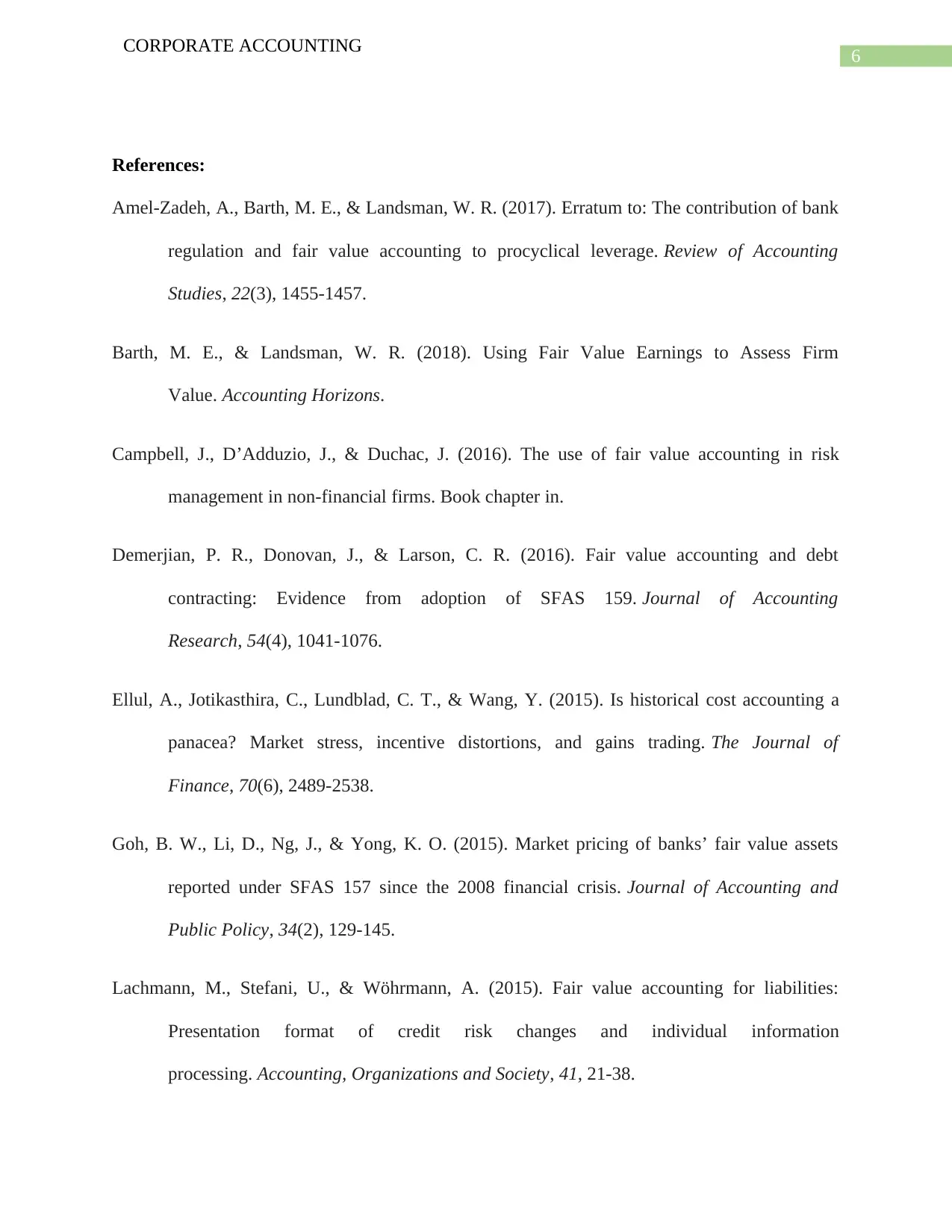
6
CORPORATE ACCOUNTING
References:
Amel-Zadeh, A., Barth, M. E., & Landsman, W. R. (2017). Erratum to: The contribution of bank
regulation and fair value accounting to procyclical leverage. Review of Accounting
Studies, 22(3), 1455-1457.
Barth, M. E., & Landsman, W. R. (2018). Using Fair Value Earnings to Assess Firm
Value. Accounting Horizons.
Campbell, J., D’Adduzio, J., & Duchac, J. (2016). The use of fair value accounting in risk
management in non-financial firms. Book chapter in.
Demerjian, P. R., Donovan, J., & Larson, C. R. (2016). Fair value accounting and debt
contracting: Evidence from adoption of SFAS 159. Journal of Accounting
Research, 54(4), 1041-1076.
Ellul, A., Jotikasthira, C., Lundblad, C. T., & Wang, Y. (2015). Is historical cost accounting a
panacea? Market stress, incentive distortions, and gains trading. The Journal of
Finance, 70(6), 2489-2538.
Goh, B. W., Li, D., Ng, J., & Yong, K. O. (2015). Market pricing of banks’ fair value assets
reported under SFAS 157 since the 2008 financial crisis. Journal of Accounting and
Public Policy, 34(2), 129-145.
Lachmann, M., Stefani, U., & Wöhrmann, A. (2015). Fair value accounting for liabilities:
Presentation format of credit risk changes and individual information
processing. Accounting, Organizations and Society, 41, 21-38.
CORPORATE ACCOUNTING
References:
Amel-Zadeh, A., Barth, M. E., & Landsman, W. R. (2017). Erratum to: The contribution of bank
regulation and fair value accounting to procyclical leverage. Review of Accounting
Studies, 22(3), 1455-1457.
Barth, M. E., & Landsman, W. R. (2018). Using Fair Value Earnings to Assess Firm
Value. Accounting Horizons.
Campbell, J., D’Adduzio, J., & Duchac, J. (2016). The use of fair value accounting in risk
management in non-financial firms. Book chapter in.
Demerjian, P. R., Donovan, J., & Larson, C. R. (2016). Fair value accounting and debt
contracting: Evidence from adoption of SFAS 159. Journal of Accounting
Research, 54(4), 1041-1076.
Ellul, A., Jotikasthira, C., Lundblad, C. T., & Wang, Y. (2015). Is historical cost accounting a
panacea? Market stress, incentive distortions, and gains trading. The Journal of
Finance, 70(6), 2489-2538.
Goh, B. W., Li, D., Ng, J., & Yong, K. O. (2015). Market pricing of banks’ fair value assets
reported under SFAS 157 since the 2008 financial crisis. Journal of Accounting and
Public Policy, 34(2), 129-145.
Lachmann, M., Stefani, U., & Wöhrmann, A. (2015). Fair value accounting for liabilities:
Presentation format of credit risk changes and individual information
processing. Accounting, Organizations and Society, 41, 21-38.
Paraphrase This Document
Need a fresh take? Get an instant paraphrase of this document with our AI Paraphraser
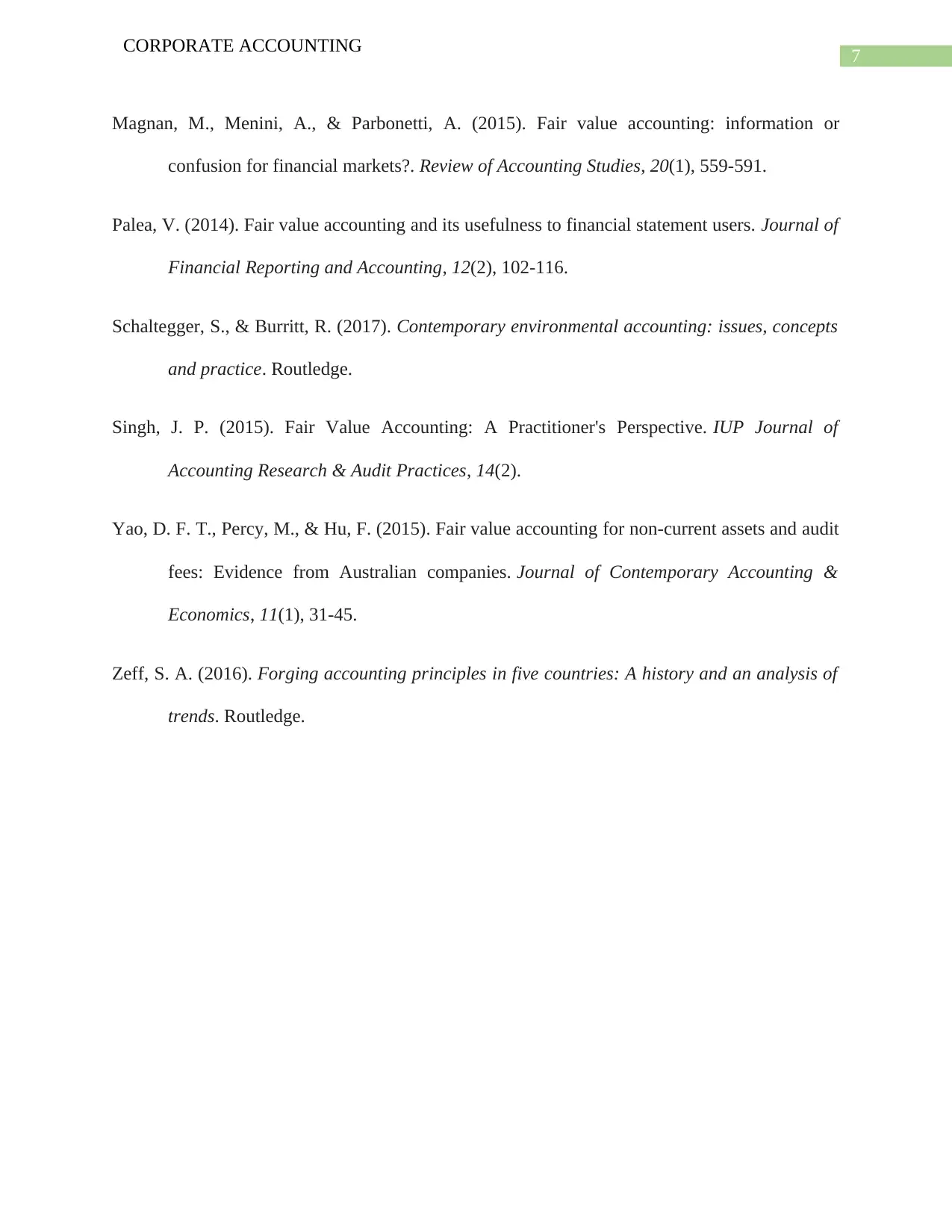
7
CORPORATE ACCOUNTING
Magnan, M., Menini, A., & Parbonetti, A. (2015). Fair value accounting: information or
confusion for financial markets?. Review of Accounting Studies, 20(1), 559-591.
Palea, V. (2014). Fair value accounting and its usefulness to financial statement users. Journal of
Financial Reporting and Accounting, 12(2), 102-116.
Schaltegger, S., & Burritt, R. (2017). Contemporary environmental accounting: issues, concepts
and practice. Routledge.
Singh, J. P. (2015). Fair Value Accounting: A Practitioner's Perspective. IUP Journal of
Accounting Research & Audit Practices, 14(2).
Yao, D. F. T., Percy, M., & Hu, F. (2015). Fair value accounting for non-current assets and audit
fees: Evidence from Australian companies. Journal of Contemporary Accounting &
Economics, 11(1), 31-45.
Zeff, S. A. (2016). Forging accounting principles in five countries: A history and an analysis of
trends. Routledge.
CORPORATE ACCOUNTING
Magnan, M., Menini, A., & Parbonetti, A. (2015). Fair value accounting: information or
confusion for financial markets?. Review of Accounting Studies, 20(1), 559-591.
Palea, V. (2014). Fair value accounting and its usefulness to financial statement users. Journal of
Financial Reporting and Accounting, 12(2), 102-116.
Schaltegger, S., & Burritt, R. (2017). Contemporary environmental accounting: issues, concepts
and practice. Routledge.
Singh, J. P. (2015). Fair Value Accounting: A Practitioner's Perspective. IUP Journal of
Accounting Research & Audit Practices, 14(2).
Yao, D. F. T., Percy, M., & Hu, F. (2015). Fair value accounting for non-current assets and audit
fees: Evidence from Australian companies. Journal of Contemporary Accounting &
Economics, 11(1), 31-45.
Zeff, S. A. (2016). Forging accounting principles in five countries: A history and an analysis of
trends. Routledge.
1 out of 8
Related Documents
Your All-in-One AI-Powered Toolkit for Academic Success.
+13062052269
info@desklib.com
Available 24*7 on WhatsApp / Email
![[object Object]](/_next/static/media/star-bottom.7253800d.svg)
Unlock your academic potential
Copyright © 2020–2025 A2Z Services. All Rights Reserved. Developed and managed by ZUCOL.





